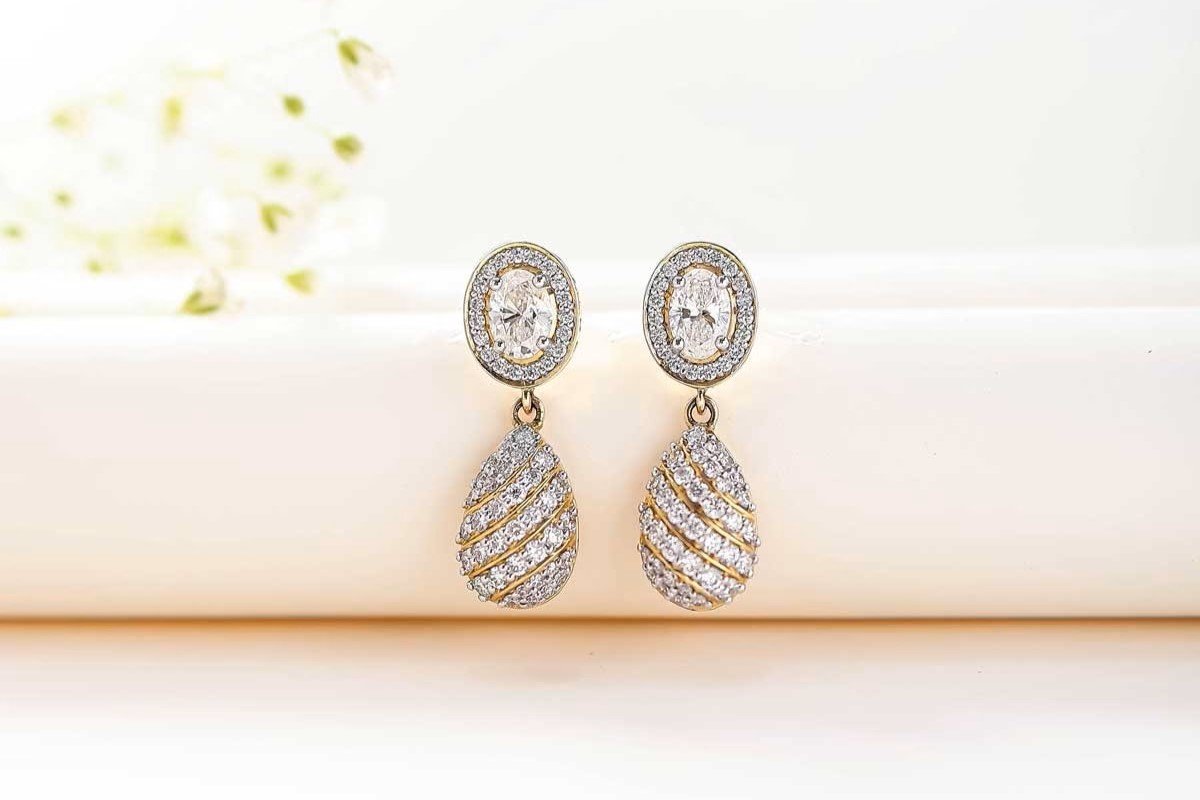Introduction: Functional Role of Earrings
Earrings are functional jewelry components designed to adorn the ear. Beyond aesthetics, they help emphasize facial features, communicate social status, and mark meaningful moments. Variations in design and material allow them to be used in formal, casual, and ceremonial settings.

Definition and Construction of Earrings
Earrings are wearable ornaments made for ear placement using different materials and fastening techniques.
Key Specifications:
• Placement – Earlobe, cartilage, or other pierced areas
• Materials – Gold, platinum, silver, glass, polymers, sustainable alloys
• Style Range – Minimalist (studs) to elaborate (chandeliers)
• Cultural Relevance – Reflects identity or status
• Usage – Routine wear, formal events, or self-expression
Historical Context and Symbolic Functions
Earrings have roots in ancient civilizations (e.g., Egypt, Greece, Rome, Asia), where they signified power, artistry, and ceremonial importance.
Modern Symbolism:
– Milestone Markers: Graduation, weddings, rites of passage.
– Personal Expression: Individuality and fashion alignment.
– Bridal Applications: Blend of tradition and contemporary design.
Popular Types & Styles
Here’s a quick comparison of the most popular earring styles and their best uses:
Style | Design Features | Ideal Occasions | Styling Tip |
Stud | Small, sits close to the ear | Everyday wear, minimal looks | Perfect for layering with other earrings |
Hoop | Circular or semi-circular design | Casual to formal | Choose larger hoops for drama, smaller for subtlety |
Drop | Hangs below the earlobe | Work, dinners, events | Matches well with sleek updos |
Chandelier | Multiple tiers, ornate | Weddings, galas | Balance with simple necklines |
Ear Climbers | Extends along the ear curve | Fashion-forward events | Works best with minimal necklaces |
Huggies | Small hoops that hug the lobe | Everyday comfort | Great for stacking |
For a full breakdown, explore our types of earrings guide.
Setting Mechanisms & Material Analysis
Common Setting Types:
– Prong: Exposes gemstone, maximizes brilliance.
– Bezel: Encases gemstone, enhances security.
– Halo: Central stone surrounded by smaller stones for increased reflectivity.
– Pavé: Dense grouping of small stones, creates continuous shimmer.
Material Considerations:
– Metals: Gold, platinum, sterling silver, mixed alloys.
– Gemstones: Diamonds, pearls, colored stones.
– Selection Factors: Durability, skin sensitivity, intended aesthetic.
Criteria for Earring Selection: Face Shape & Personal Style
Face Shape Guidelines:
– Round: Elongating designs (drops, chandeliers).
– Oval: Universal compatibility; adaptable to all styles.
– Heart-Shaped: Teardrop/chandelier offsets sharp chin.
– Square: Circular/hoop styles soften angularity.
Styling Considerations:
– Align earring choice with personal style profile (minimalist, vintage, modern).
– Evaluate comfort, weight, and proportionality to facial features.
– Prioritize functional requirements (daily use vs. event-specific).
Summary:
Earrings integrate engineering, material science, and design. Proper selection optimizes both functional and aesthetic outcomes, with considerations spanning structural style, material integrity, and contextual appropriateness.
Everyday vs Occasion Earrings
- Everyday Earrings
– Designed for comfort and regular use
– Practical for work, casual settings, and daily routines
– Typical styles: studs, huggies, minimalist hoops
- Occasion Earrings
– Intended for formal or special events
– Enhanced by bold, visually impactful designs
– Examples: chandelier earrings, statement drops, ornate pieces
- Recommendation
– Maintain a collection that includes both everyday and occasion earrings for maximum versatility in styling
Modern Trends & Fashion Influence
– Key Trends
– Asymmetrical earring pairs
– Use of geometric and unconventional forms
– Mixing metals (e.g., gold and silver in a single piece)
– Increased adoption of sustainable materials and lab-grown gemstones
– Fashion Influence
– Runway trends are driving mainstream consumer preferences
– Celebrity endorsements significantly impact demand for designer and high-end earring styles
Earring Care Guidelines
– Post-Wear Maintenance
– Clean with a soft, dry cloth after each use to remove oils and residues
– Storage
– Store earrings in separate compartments to prevent scratches and tangling
– Chemical Exposure
– Avoid direct contact with perfume, hairspray, and harsh chemicals to maintain finish
– Inspection
– Schedule periodic professional inspections for gemstone and diamond settings
– Further Resources
– Reference dedicated earring care materials for additional guidance
Pro Tips – Smart Shopping Practices
- Material Verification
– Confirm metal purity via hallmark stamps (e.g., 14K, 18K, 925)
- Gemstone Authentication
– Request recognized laboratory certification for diamonds and gemstones
- Fastening Security
– Inspect earring backs and clasps for secure fit and comfort
- Timeless Selections
– Invest in classic styles, such as pearl earrings, for long-term versatility
- Online Purchasing
– Choose vendors with detailed product images, transparent return policies, and explicit quality guarantees
Conclusion – Functional & Aesthetic Role of Earrings
– Earrings serve both decorative and expressive purposes
– Selection should be based on face shape, occasion, and individual preference
– Versatile collections—ranging from subtle studs to statement designs—enhance user confidence and complete overall appearance
Additional Resources:
– Shop Diamond Earrings
– Explore Designer Earrings



